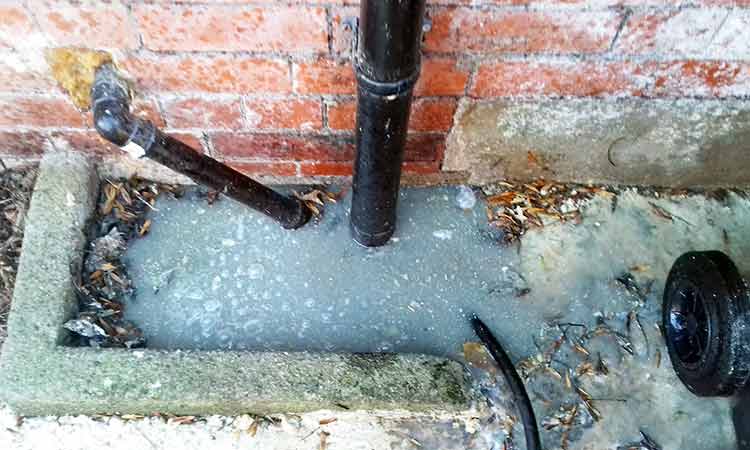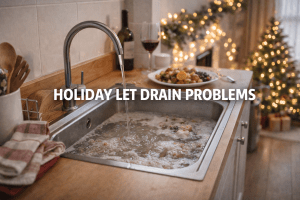Kitchen drains in Bournemouth homes take a daily beating. From cooking oils and food waste to dish soaps and detergents, it doesn’t take long for buildup to form inside pipes — especially during colder months when grease solidifies faster.
Whether you’re living in Southbourne, Winton, Bear Cross or Boscombe, knowing how to prevent blockages can save you money, stress and emergency callouts.
In this guide, Bournemouth Drains24 explains exactly how to stop kitchen drains blocking — and what to do if you notice slow drainage.
Why kitchen drains block so easily
Kitchens are the number one cause of domestic blockages. Why?
- Grease and cooking oils solidify in the pipes
- Coffee grounds and food scraps stick to internal pipe walls
- Dish soaps and detergents form residue over time
- Fibrous foods (celery, onion skins, pasta) expand and clog traps
- Cold pipes in winter cause fatbergs to harden
Bournemouth’s mix of older buildings and modern flats means many homes use narrow or aging waste pipes that clog quicker.
Simple daily habits to prevent kitchen drain blockages
Avoid pouring fats and oils down the sink
Even small amounts of oil harden in colder pipe sections. Always wipe pans with a tissue and bin the grease.
Use a sink strainer
This cheap tool blocks food particles from entering the drain and causing buildup.
Run hot water after washing up
Flush the system with a kettle of hot water weekly to melt light grease residue.
Don’t overload the waste trap
Empty and clean the U-bend every few months — hairline food buildup eventually blocks the whole pipe.
Keep coffee grounds out of the sink
Coffee acts like cement when mixed with fats or soap.
Best ways to clear mild blockages
If you notice slow draining:
- Pour boiling water to melt grease
- Use a biodegradable enzyme cleaner
- Clean the U-bend manually
- Flush with hot water + washing-up liquid
Avoid harsh chemicals — they can damage older Bournemouth pipework, particularly clay or thin PVC sections.
When to call a professional
It’s time to call Bournemouth Drains24 if you notice:
- Repeated slow drainage
- Strong kitchen drain smells
- Washing machine backflow into the sink
- Water pooling around the gully outside
- Gurgling noises from kitchen or bathroom pipework
These signs usually indicate deep blockages, collapsed joints, or grease buildup far beyond the reach of DIY methods.
How Bournemouth Drains24 fixes kitchen blockages
High-pressure jetting
Breaks down hardened fatbergs, food buildup, and detergent scale safely.
CCTV drain surveys
Identifies structural issues, misaligned joints, trapped debris and early root intrusion.
Pipe relining (if required)
Repairs cracked or worn pipes without excavation.
Preventative maintenance
Regular jet washing keeps busy kitchen drains flowing.
All work follows WJA and NADC industry safety standards.
Common kitchen drain issues in Bournemouth
Local factors include:
- Heavy clay soil causing joint movement
- Coastal humidity increasing drain odours
- High-usage rentals with increased food waste
- Older terrace properties with narrow waste pipes
- Cold winter nights solidifying fats
These conditions make preventative care vital for Bournemouth homes.
Kitchen drain blockages are preventable with a few simple habits and occasional professional maintenance.
📞 Call Drains24 for kitchen drain unblocking in Bournemouth.
Fast, reliable, and available 24/7 across the entire Bournemouth area.
Kitchen Drain Unblocking FAQs
What causes kitchen drains to block in Bournemouth homes?
Kitchen drains commonly block due to cooking oils, grease, food scraps, coffee grounds and detergent residue building up inside the pipes. Colder weather causes fats to harden, which makes blockages form even faster.
How can I stop grease blocking my kitchen sink?
Never pour cooking oils or fats down the drain. Allow grease to cool, wipe pans with a tissue, and throw it in the bin. Flush the pipe weekly with hot water to melt small amounts of residue.
Why does my kitchen drain smell?
Smells usually come from trapped grease, food residue, or stagnant water inside the U-bend. If the odour persists after cleaning, deeper buildup or a partial blockage may be present.
Are chemical drain cleaners safe to use?
Chemical cleaners can damage older pipes and harden greasy deposits, making the issue worse. Enzyme cleaners or professional jetting are safer, more effective options.
When should I call a professional drainage engineer?
If your sink drains slowly repeatedly, produces gurgling noises, smells bad, or backs up when appliances run, it’s time to call Bournemouth Drains24 for expert unblocking.




